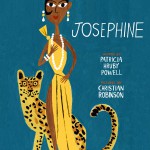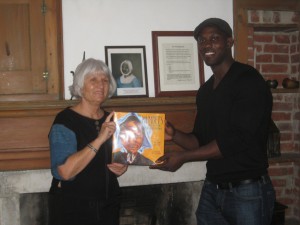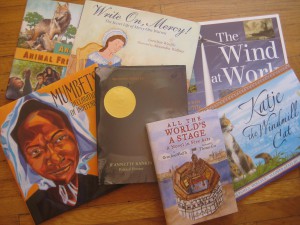Welcome, Gretchen Woelfle, my friend and guest blogger.
Thanks, Patricia, for inviting me to the Writer’s Process blog on your very own blog, and for showing me how it can be done here. [https://talesforallages.com/what-how-and-why-do-you-write/] At the moment I’m blogless, but until last month I was part of a group blog, INK: Interesting Nonfiction for Kids (inrethink.blogspot.com) Unfortunately its sun has set – no more new posts, but all the old ones are up forever. Including a wonderful interview Patricia  gave me about her stupendous new book, Josephine. You can read the interview here. http://inkrethink.blogspot.com/2014/03/josephine-rocks-and-so-does-her-author.html
gave me about her stupendous new book, Josephine. You can read the interview here. http://inkrethink.blogspot.com/2014/03/josephine-rocks-and-so-does-her-author.html
1. What are you currently working on?

I’m working on revisions for Answering the Cry for Freedom: African Americans in the American Revolution, a group biography that will be published by Boyds Mills/Calkins Creek in 2016. This book grew out of research I was doing for by latest book, Mumbet’s Declaration of Independence. As I read about African Americans during this era I couldn’t stop adding them to the mix and ended up with twelve subjects. That was five years go. Then I came upon still another woman that I couldn’t leave out. So I’ve got a lucky thirteen biographies in the book.
WHAT WAS I THINKING?
It’s been an enormous amount of work but utterly absorbing.
I’ve got another biographical subject floating around my head and another history idea, as well as an old biographical project that needs reviving.
2. How does your work differ from others in its genre?
Which genre? I can’t settle down to just one.
I’ve published middle grade history, fiction and nonfiction picture books, a historical novel, picture book and middle grade biographies, and now a YA group biography.
The biographies are obviously historical, but even my fiction has been inspired by true incidents.
However, to break the mold, I’ve got an editor reading a contemporary middle grade novel based in Micronesia. My research on this one was on-site.
I can’t claim to be unique with any of this. I just write what I’d like to read. Not necessarily what I know, but what I want to learn more about.
3. Why do you want to write?
To tell the stories of people whose stories haven’t been told. Did you know that the British Army offered freedom to those who left their masters and joined the British side? 20,000 slaves did just that. I didn’t learn about that in school. You’ll read a few of these stories in my next book. Also, the push for abolition did not begin in the 1800s with Douglass, Tubman, and the underground railroad, but during the Revolution with all that buzz about liberty and equality. You can read about that too, in Answering the Cry for Freedom.
4. How does your individual writing process work?
I’ll get an idea, sometimes from previous research, and let it simmer (usually,) or jump right in (occasionally.) I read other books, go to UCLA to troll their scholarly journals, look up the footnotes to find more stuff to read. Tunnel deep into the internet to find primary sources from hundreds of years ago, email and phone experts to ask questions. If possible I travel to the hometowns and even the houses of my subjects to “find” them, for landscape, environment, geography can reveal a lot. In researching Answering the Cry I traveled from Virginia to Nova Scotia searching out details and atmosphere. I’d love to repeat the trip with book in hand after it’s published!
I don’t have a day job, so I get up, make my breakfast, carry it to the computer and eat while I’m checking email, headlines, and the latest football (soccer) news from England. If I’m good, that doesn’t take too long and I’ll get on with researching, writing, or rewriting. If I’m bad, I can be distracted until lunch. I do Facebook, but not Twitter. And, of course, check email all day long.
A chiropractor recommended that I stand up from the computer and walk around, even for a minute of two, every half hour. I usually remember to do it about every three hours. Wander into the garden to do a little weeding. Get a cup of tea. Hang the laundry outside.
Other time outs from writing: Trips to the library, monthly meetings of my critique group, occasional school visits or travel to conferences to present, or sign, or just lurk.
I don’t like to leave the house until the end of the day. I meet friends for dinner, not lunch. I go to the gym after I’ve finished working. I might answer emails and such in the evening, but I don’t tend to write then. I’ve either run out of steam, or I get revved up and then can’t sleep.
Some of my friends like to write in cafés, but I work at home, in my office or dining room or table in the garden. Teatime is 4 pm, again sitting at the computer.
I try to spend a few months a year in London, thanks to home exchanges that don’t cost me a penny. Have laptop, will and do travel.
I’ve tagged two of my favorite writers to follow me next week.
Joanne Rocklin, awesome novelist and wonderful cook, will share her secrets at http://www.joannerocklin.com/blog.htm next week.
And Sue Macy, fellow INK blogger and writer of stunning biographies and other book about women’s history and women’s sports history will tell all at http://www.suemacy.com/sues-views
For more about Gretchen and her books, see www.gretchenwoelfle.com
Leave a Reply